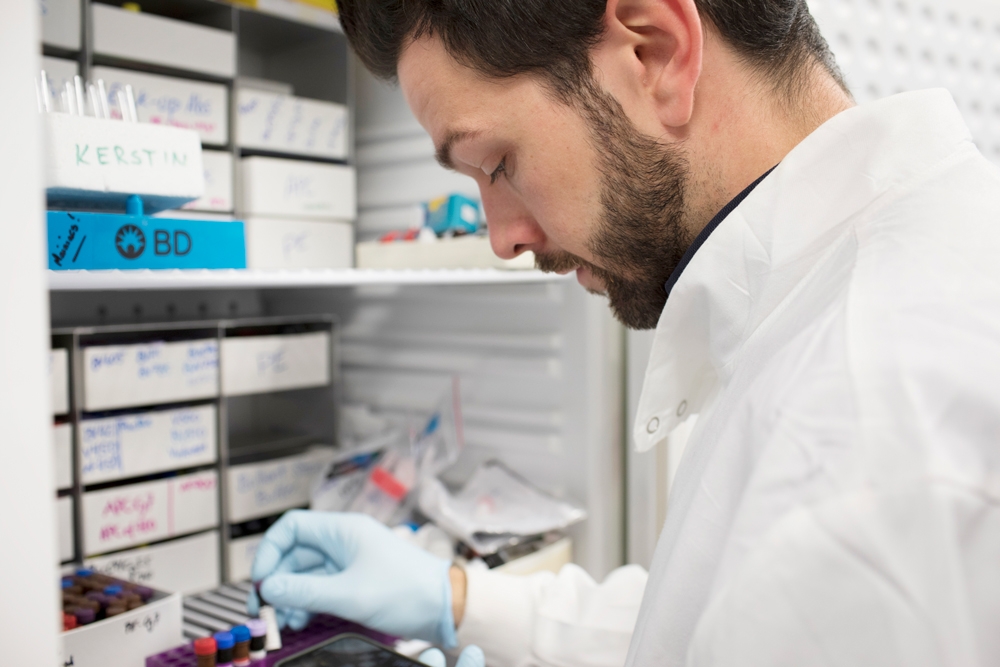Targeting viral hepatitis
Unusually among infectious diseases, deaths from viral hepatitis and related illnesses are on the rise.
While other major health issues such as tuberculosis, malaria, and HIV are decreasing in prevalence, viral hepatitis is trending upwards. In figures of annual deaths, viral hepatitis has in fact recently overtaken these well-known global health priorities. This is a significant cause for concern.
Despite much progress in antiviral drugs for treating hepatitis C, there is relatively limited research into therapies tailored for the hepatitis B virus (HBV).
Thanks to you, we’ve funded vital new research by Dr Leo Swadling from UCL. He is investigating new methods to cure hepatitis B, building on cutting-edge technologies to utilise the body’s natural immune system.
Our goal is to create vaccines that simulate the blueprint of an effective immune response.Dr Leo Swadling
UCL
Moving beyond antiviral drugs
“Hepatitis B is a complicated virus, and we don't fully understand the precise crystal structures of its proteins,” says Dr Leo Swadling. “As a result, the antivirals we currently have are non-specific and not tailored to target hepatitis B itself. Treatments at present can keep the virus in check, but not eliminate it completely, meaning life-long treatment is required. This comes with compliance issues, stigma and off-target effects.”
The medical research community recognises the need for new HBV treatment options. Therefore, Leo set out with the aim to study people who naturally resist HBV infections, clearing the virus simply with their own highly efficient immune response.
Leo explains, “So far, studying a successful immune response, especially at the site of the infection in the liver, hasn't been extensively done before. With Professor Mala Maini at UCL, we collaborated with groups in Barcelona and the UK, utilising two of the largest liver transplantation centres in the world. This allowed us to screen donated livers intended for transplantation to identify immune responses to hepatitis B.”

“By screening these livers on a large scale, we could identify enough individuals who had naturally cleared the virus. Our goal is to now use this information as a blueprint to design vaccines that mimic these successful immune responses.”
The group have identified some characteristics of a good immune response. Now, they aim to compare the effective immune response in individuals who manage to eliminate HBV, to that in chronically infected individuals.
“This comparison is something we still need to pursue. Our goal is to create vaccines that simulate the blueprint of an effective immune response.”
Understanding the liver’s immune response
Looking back on other achievements over the course of the project, Leo explains, “We have also made great progress in studying immune responses in the liver, comparing it to other areas, like the blood.”
The liver’s constant exposure to external substances, like viruses and bacteria, makes its immune response particularly interesting.
In general, the body has two ways of remembering past exposures: antibodies and T cells. Leo explains, “T cells are specialised immune cells that identify and destroy infected cells. These ‘soldiers’ are specific to one virus, such as hepatitis B, HIV, or SARS-CoV-2.
“In the liver, we've shown that virus-specific immune cells can persist for decades, adapting to the liver environment. This has led us to explore ways to improve the success of liver immune cells, similar to those in the blood.”
The team has also supported the fight against HCV infections. “One of our vaccines, developed with Professor Ellie Barnes from the University of Oxford, induces the strongest immune response seen in humans for hepatitis C. This vaccine progressed to phase 2 trials, where it is given to at-risk individuals to see if it protects them. Although the trial didn't significantly prevent infections, it did limit the virus’s ability to replicate,” says Leo.

Through continued research, we can deepen our understanding of immunity responses to specific viruses.Dr Leo Swadling

The future landscape for infectious diseases
The field of immunology is experiencing an exciting era of change. Since the COVID-19 pandemic, we’ve seen the significant impact that vaccines can have. The pandemic also importantly demonstrated the UK’s ability to scale up vaccine production quickly and efficiently.
Leo himself was called on to switch his focus to COVID-19 during the pandemic, “When the new virus emerged, we needed to understand the immune responses people were having, including the T cells and antibodies they were generating. We wanted to study responses that provided the most effective natural immunity, to emulate similar results through our own vaccines.”
Now, the challenge facing scientists is to tailor the concept of vaccine development to specific viruses. Leo adds, “We have the technology to create vaccines rapidly and cost-effectively, test them on a global scale, and manufacture them worldwide.
“Through continued research, we can deepen our understanding of immunity responses to specific viruses. With this knowledge, we can develop targeted vaccines to tackle our most prevalent illnesses and diseases.”
A thank you to our donors
Reflecting on the research grant, Leo says, “The funding allowed me to create my own independent research team, to follow my interests and generate exciting results. It also freed me up to engage with many researchers, develop my own ideas, and work on more ambitious projects.”
Immunology is a fast-moving field. Thanks to you, we can fund emerging leaders like Leo, who are working to cure deadly viral infections and protect us from future epidemics and disease outbreaks.
Sign up to our newsletter
Keep up to date with all our latest news and events, as well as ways you can get involved in our fundraising activities.
Sign up now